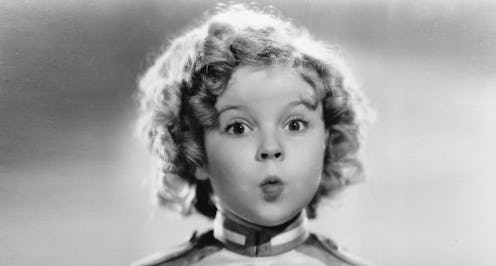Entertainment
Why Shirley Temple Should Be Your Role Model

Lemon-lime soda, grenadine, and a cherry on top. Those are the three ingredients that go into the popular non-alcoholic drink, the Shirley Temple. And it's only right that it was named for the child star — Temple, who passed away Monday at 86 years old, was spritely, sweet, and had a little something extra that made her one of the most beloved actresses of the 20th century. And, as a young girl who grew up on old movies, I drank both the child star and her signature cocktail up.
Before Britney Spears, Miley Cyrus, and whatever robot Disney assembled this week invaded our pop culture lexicon, children of the '80s and early '90s had little idolatry to choose from. Yes, the era that brought us flannel shirts and scrunchies also brought us Nickelodeon — and, along with it, young heroines like the plucky Clarissa Darling and Alex Mack — but some of us poor little poor girls hardly had enough funds to afford more than 11 channels on our televisions. So girls like myself turned to old movies. And before I graduated to early 1920s slapstick in the form of Hal Roach's Little Rascals (everything I needed to learn about humor I learned from "Our Gang Follies of 1936," and everything I needed to learn about racism I learned from "The Kid From Borneo"), all I had was Bright Eyes and Curly Top.
But that was just fine for me. Because, though I had missed out on the cultural impact of series like You Can't Do That On Television, I had a childhood idol that inspired generations of young girls. Correction: a childhood idol that inspired generations of badass young girls. She may have become famous because of her curly hair and dimples — which were such definable character traits, two films were named after them — but she also was beloved for her confidence and independence, something that was typically not recognized in any female in the early 20th century. Particularly one who was only six years old.
Of course, this was often the product of her movies themselves. Temple often played an orphan, or a tomboy forced to make it on her own after the death of one of her parents. (Typically, the parent who prematurely passed on? The mother, which, naturally, begs its own analysis on male dependence, but that's an entirely different conversation.) Temple's characters never had it easy, forcing her to rise above the hard times the Depression handed out with, yes, dancing and adorableness, but also an astonishing amount of wit. She traded barbs with those 20, 30, or 40 years her senior, proving to be the victor in arguments and seemingly impossible situations. And she was welcoming of all characters, no matter their gender, race, or socioeconomic status. Whether it was Curly Top, Poor Little Rich Girl, or any of the other 20-something films Temple starred in as a youth, Temple's movies showcased a young girl whose precociousness and charming sensibility was encouraged. Whose opinion was welcomed. And whose abilities were endless.
The same went for the actress herself. Far more inspirational than her plucky characters was Temple, whose power in the industry as a young girl went unmatched for decades. Her work in the mid-1930s was some of the most lucrative in the industry, leading her to top the box office with films like The Littlest Rebel (a unsettlingly pro-Confederacy Civil War feature, it should be noted) and Our Little Girl. Such power at the box office led to power in the studio, allowing Temple, not yet 10 years of age, to dictate her own scenes and choreography. During a time when the Disney machine is often accused of manufacturing the lives and personalities of its talent, it's easy to be nostalgic for an era that championed, and rewarded, a young girl for being herself.
That is, so long as she continued being cute. Any fan of Temple's would note how disappointing it was to see the actress flail in her teenage life, never nabbing the roles or the box office net that she did as a child. (God forbid the woman, you know, grow.) And it wasn't long until Temple retired from film, clearly tired of an industry that was unfairly tired of her. But though many of Temple's films were of their time (there are plenty of racial overtones to unpack throughout her filmography), the lessons we learned from them are still pertinent today. That young girls deserve our attention. That young girls shouldn't be forced to conform to gender norms. And that young girls can be encouraged at a young age to strive for power.
As the number of channels in our cable boxes continue to grow, and social media tempts us to think more in the now than in the past, it's inevitable that Temple's star power, which lasted for generations, will begin to fade for the youths of tomorrow. But the idea that some girls lucky enough to have access to Bright Eyes or Rebecca of Sunnybrook Farm might just learn a lesson or two on individuality from the dearly departed Hollywood icon? Well, I'll certainly toast a Shirley Temple to that.
Image: 20th Century Fox